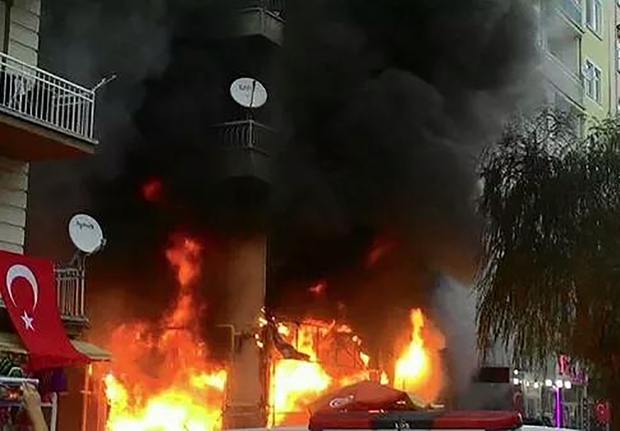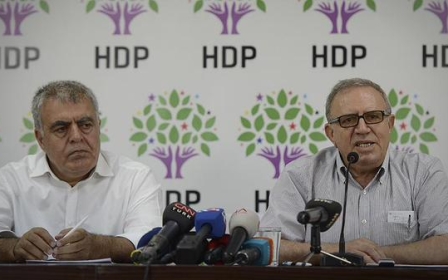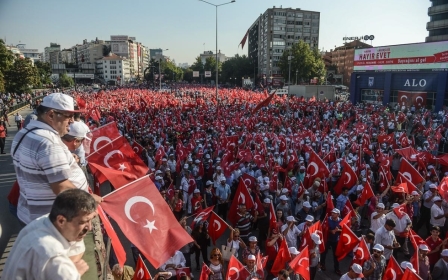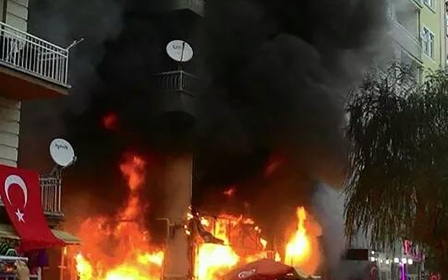Turkey: For peace to succeed, PKK and HDP must part

The recently reignited conflict between Turkey and the Kurdish militant group the PKK and the faltering peace process has led to a spate of international confusion over who is who, who broke the ceasefire and why. Therefore, it seems appropriate to start with some facts.
The PKK are a secessionist militant Marxist group that started a war against the Turkish state in 1984. They are recognised as a terrorist organisation by Turkey, the United States and the EU. The PKK have mostly operated from the Kandil mountains in the north of Iraq, but they also receive support and are present in Kurdish populated areas of Turkey.
The PKK have aspired to the role of sole representation of Kurdish rights, due to the lack of a political peace process and a legitimate Kurdish political voice in the Turkish parliament. Although Kurdish parties existed before, they were either closed or Kurdish MPs entered parliament as independent candidates.
The last few years have seen a dramatic turn of events. First of all, a peace process was started by the AK Party government in 2012 with direct negotiations between MIT, the Turkish intelligence service, and the jailed head of the PKK, Abdullah Ocalan. For the first time, a Kurdish party, the HDP, entered the Turkish Parliament winning 80 seats, ensuring legitimate Kurdish representation in the remaking of a new constitution. (The present constitution is a patch work of amendments built on the original 1982 constitution drafted by the generals of the 1980 coup). So what went wrong?
The secret talks between MIT and Ocalan were a huge breakthrough in a country where one couldn’t even mention the word “Kurd” not so long ago. But, in the long run, this framework could only be part of a sustainable peace process. All parties were aware of this. But there was also a legitimate concern about the transparency of negotiations. A fundamental rule in conflict management is that if sides are supposed to compromise on given things, they cannot do so publicly. While transparency is ruled out, parties must be able to give information to their supporters and concerned parties as to how the negotiations are proceeding. Therefore two issues were at stake: how to make the peace talks sustainable by widening the participation of other actors, while preserving the secrecy of the talks.
The government, the president and the Kurdish party, the HDP, could not agree on this issue, and the HDP missed the critical nature of this dilemma. Hence, the peace talks faltered but they were not over until the ceasefire was broken. The KCK, the political wing of the PKK, first declared they would break the ceasefire on 11 April 2015. This was followed by the bombing in Suruc on the 20 July by ISIS in which left 32 young, mostly Kurdish, activists preparing for an aid mission to the neighbouring Syrian town of Kobani, died. Then the PKK broke the ceasefire by killing two policemen in their homes as they slept. They continued with serial attacks on the Turkish armed forces. It was after these attacks that the government started their armed reprisals against the terror group within Turkey and across the border in Northern Iraq.
The PKK’s recent offensive was due to their exploitation of the relaxed security environment during the peace process to arm themselves to the teeth in the Kurdish populated cities and rural areas, including the stationing of 800kg of explosives and firearms stockpiled in residential areas. During this time, the YDG-H, the youth guerrillas of the PKK, strengthened their position in urban areas. IEDs between 400-1000kgs each connected with wireless detonators and cables were buried and concealed under the main roads.
While the government is criticised for relaxing the security environment to the degree that all this went about unhampered, it is impossible that the HDP, which gets most of its votes from this region and the Kurdish elected mayors, did not notice what was going on. Then why did they allow this while a peace process was going on and the Kurds had entered parliament as a party for the first time? That is a source of bafflement for many.
Meanwhile the PKK continued with their masterplan. With urban militias in place, they dug trenches around these areas, preventing security forces from reaching them, and attempted to incite a popular uprising with the endgame of declaring independence/autonomy, and uniting with the Kurdish so-called cantons across the border in Syria.
The conflict in areas like Cizre were devastating and the civilian population were caught in the crossfire. The PKK had moved the conflict from the mountains into the cities. Now the armed forces were engaged in urban warfare street by street with trained guerrilla forces embedded among the civilian population. Meanwhile the PKK continued its attacks on soldiers and police in the rural areas as well as attacking garrisons and residencies, leading to the deaths of many from the security services.
What is the HDP – now a legitimate actor in the Turkish political system - doing about this? Apart from blaming the government, and particularly the president, very little else. The HDP are between a rock and a hard place because they cannot divorce themselves from the dominant actor in the Kurdish movement, which is still the PKK. They claim the PKK has support among their voters. But they miss a crucial point. Never in history has an armed group ever successfully transformed into a legitimate political actor.
Take the Resistance during World War Two. Although they enjoyed a great deal of popularity, when the war was over, as much as they wanted to, they could not transform into legitimate political actor. They left the arena to more experienced politicians who returned from exile. The HDP have to make up their minds if they are politicians or the extension of an armed group. In the Northern Ireland talks, Sinn Fein, the political party, negotiated on the basis of a political settlement. The IRA, the armed group, negotiated the technicalities of disarmament. They became two separate actors in the peace process.
In Turkey the PKK and HDP have not yet separated their roles. They cannot be the same actor for a sustainable peace process. In the Northern Ireland case, Sinn Fein eventually became a much more important actor than the IRA. This has not happened in the case of HDP and the PKK. In fact, the PKK most probably broke the ceasefire because they know once the HDP becomes the stronger actor, it will also be the end of the PKK.
The HDP have not helped with their ambivalent statements either, siding with the PKK, asking for the state to cease hostilities, then asking both sides to stop, followed by a call for the PKK to lay down its arms unilaterally. In fact the leader of the HDP, Selahattin Demirtaş made what is possibly his first sensible statement recently, by stating that the Kurds did not need armed conflict anymore, that the HDP were now there, looking out for their rights, in the legitimate environment of parliament.
It came too late at the point where the Turkish state had no choice but to securitise the problem with the new offensive from the urban trenches of the east. What would any other government have done in response to an attack against its sovereignty?
Masoud Barzani, the leader of the KRG in Northern Iraq recently said: “Unfortunately the PKK did not take advantage of this opportunity [the Turkish government’s peace process initiative], they were too arrogant.” Let us hope the HDP act differently.
Gülnur Aybet is professor of International Relations and director of BAUCESS, the Centre for Security Studies, at Bahcesehir University, Istanbul.
The views expressed in this article belong to the author and do not necessarily reflect the editorial policy of Middle East Eye.
Photo: HDP bookshop burns in Kirsehir on 8 September 2015 (Twitter/@DemGencF)
Middle East Eye propose une couverture et une analyse indépendantes et incomparables du Moyen-Orient, de l’Afrique du Nord et d’autres régions du monde. Pour en savoir plus sur la reprise de ce contenu et les frais qui s’appliquent, veuillez remplir ce formulaire [en anglais]. Pour en savoir plus sur MEE, cliquez ici [en anglais].





